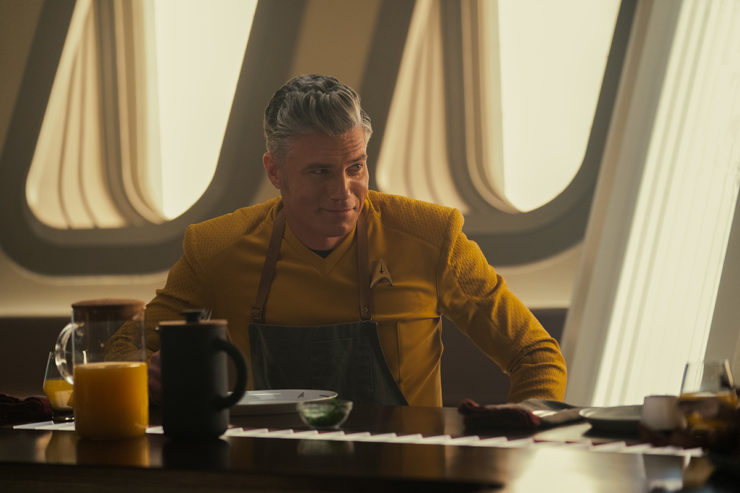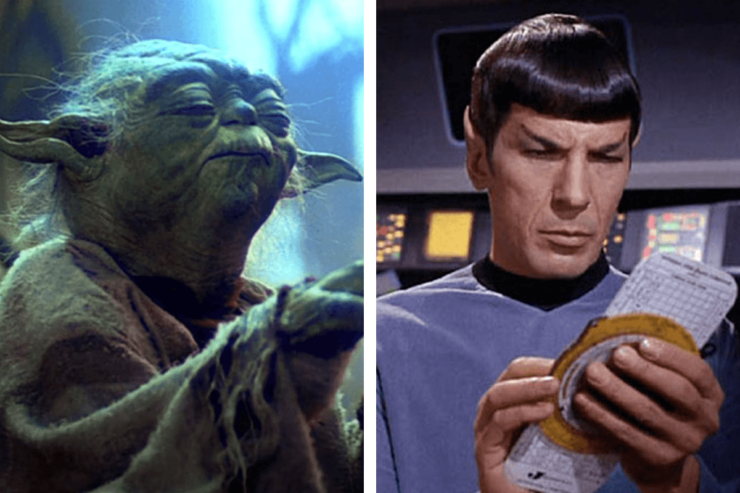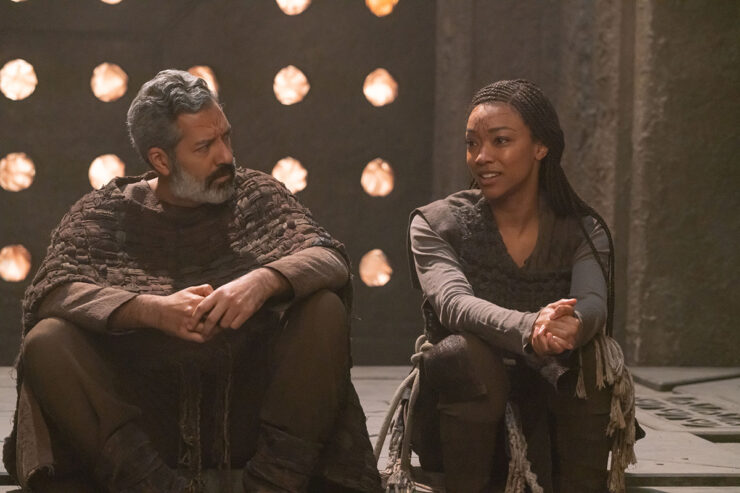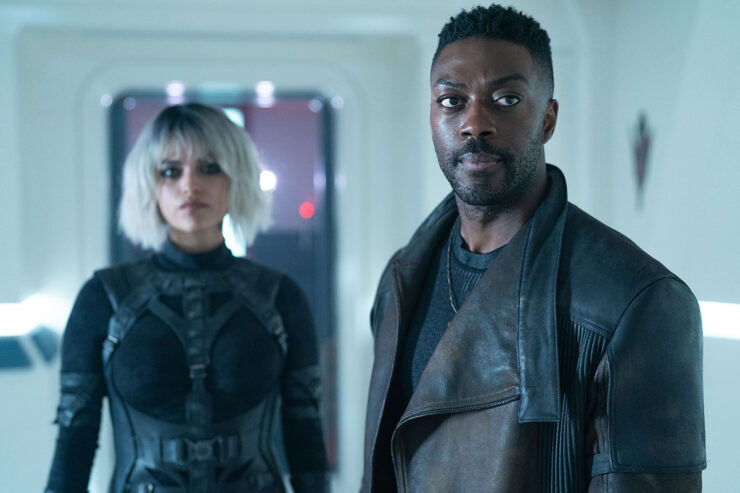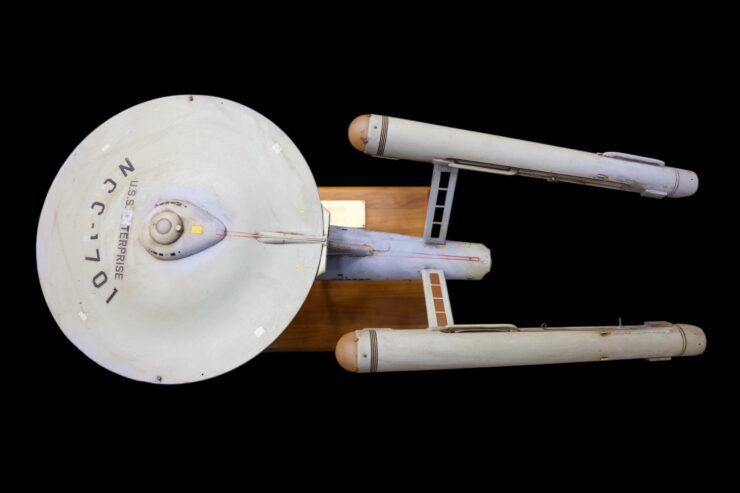It’s been said before in a multitude of ways, but it does bear repeating: The Hero’s Journey has fucked us up as a culture.
That probably sounds harsh to some, but there’s an important core of truth in the sentiment. In a century that is currently being defined by our absorption in superhero narratives, the pop culture consuming public has been inundated with stories about larger than life figures who commit feats of great heroism. Usually those feats require untold physical strength, unique moral fiber, adamantium will. We only have room for people who commit acts that are writ large, on a mountain face or across the multitude of screens we use every day, and we aren’t stopping to consider how that might shape our beliefs about what in life is worthwhile, or how we can best offer our help to others.
Which is why Captain Pike’s arc in Strange New Worlds is honestly a thing of beauty.
[Spoilers for season one of Star Trek: Strange New Worlds and season two of Star Trek: Discovery.]
Christopher Pike was already known to Trek fans as the captain who failed to entice the network well enough to keep him around when the universe got its start in 1966. While he was switched out for the more dynamic and romantic Captain Kirk, Pike became a figure of intrigue in “The Menagerie” two-parter of the show’s first season—where we learned that Spock’s former captain was largely incapacitated and only able to communicate in response to yes-or-no questions via a light at the front of his mobility chair. Spock commits treason in those episodes to get Pike to a better place, one where the Talosians who formerly captured Pike can offer him the chance at a better and more enjoyable life by virtue of their reality projecting capabilities.
So we’ve always known how Pike’s story effectively ended. And while it’s not at all boring to know a character’s future before their past, it did beg a few questions about how to tackle that knowledge on screen, should it ever come up.
Star Trek: Discovery made things a little more interesting by introducing a new snag into that fifty-year-old story. In its second season, when Captain Pike encounters a Klingon time crystal, he sees the future accident that destroys his body beyond what 23rd century medicine can reasonably repair. He experiences it as though it’s happening to him, feeling the pain, but also learning what brought him to such a terrifying choice: The chance to save the lives of many young Starfleet cadets. His fate was already known to viewers, but we now had new information that Captain Pike was also aware of this ending, and had been for years before the accident occurred.
I’ll admit to some trepidation on this particular front when Strange New Worlds began, knowing Pike would be in command and that this was sure to be on his mind. The concept of a character knowing their future is often used as mechanism for humans to examine the concept of free will—do we truly have it; is fate a real and inescapable thing; what do those concepts even mean when you add the scientific understandings of time and causality to the mix; and so on. Knowing your future is not a bad idea on its face, but plenty of stories often aren’t up to questions that big.
Strange New Worlds began by harping on the concept a lot. It’s the driving force of the first season, the background noise shaping many of Pike’s decisions as a captain and as a person. We see Spock show concern for his mental state, see Una Chin-Riley argue with Chris about fate and his ability to change what’s coming. But overall, their captain’s plan for handling this information doesn’t waver. As he says to Una, he keeps telling himself: “Stay the course; save their lives.” He has a responsibility to those cadets, and he isn’t about to shirk it just because the knowledge of what waits on the other side hurts him.
And that seems to be the final word on it until the first season’s finale, “A Quality of Mercy.” Pike has an encounter with one of the few cadets who are killed during the accident in his future, still a child at this point in life, and that meeting shakes him so badly that he considers warning the boy against enlisting in Starfleet. When he begins writing the letter that would change everything, a future version of himself suddenly appears—this is the first step on the path to altering what he saw, enabling a different reality. But future Pike needs his past self to know that what he’s trying to do won’t result in a better tomorrow. It will damage the future in ways that he couldn’t begin to imagine.
Rather than tell past Pike what will occur, the man from the future has brought along a Klingon time crystal to show him, and the rest of the finale is a redux of the Original Series episode “Balance of Terror.” Still in command of the Enterprise, Pike comes face to face with the Romulans, a species that no one in the Federation has encountered since the end of a war with them one hundred years ago. He also meets one Captain James T. Kirk, who is currently commanding the Farragut—and is immediately suspicious of how Kirk’s read on the situation might affect his reaction to this scenario as it plays out.
The episode runs us through a few fake-out scenarios where it seems as though Kirk may die, forcing the audience to wonder if perhaps this is the action that ruins the future. After all, we know that Jim Kirk is meant to command the Enterprise. It stands to reason that robbing the galaxy of him entirely would throw things off. But when it all does, in fact, go to hell… the one who winds up paying the price is Spock.
Future Pike returns, telling his past self that when he looked into the time crystal and tried to see other ways out of his conundrum, every attempt to dodge the future led to Spock’s death.
The beauty of this is that we know Spock’s story well. Kirk is important too, of course, but Spock is the architect of so many pillars of this future. He continues on in Starfleet, exploring and eventually bringing about a far-reaching peace with the Khitomer Accords. He makes intentional and lasting friendships, and works well with an incredible variety of people. He becomes an ambassador to heal the millennia-old rift between Vulcans and Romulans, bringing about Reunification. Spock is, in so many ways, a perfect stand-in for that bright and beautiful future that Starfleet and the Federation promise us. And if Pike tries to avoid his fate… he will kill him.
But there’s another little tweak in this episode that suggests at an even deeper meaning. Because Pike takes a liking to James T. Kirk, though their command styles differ. He looks up Jim’s file and has it hanging there, over his shoulder, when Spock comes in to check on him in the present. He clearly saw something in the man, and it got the wheels turning. And now we can see that it’s entirely possible Christopher Pike is the reason why Kirk comes to command the Enterprise when he can no longer do it. We’ve already watched him successfully parent a crew full of endearing misfits and help them find their way—particularly with La’an and Spock and Uhura in this first season. His calling often seems to be in orchestrating people toward their best destinies.
So here’s the real question: What if your hero’s journey is about setting up the future for the people who will carry it forward?
Future Pike tells himself that in so many words. That everyone wants to believe that they’re important, “And we are,” he says, “just… not in the way you think.” Acknowledging this is key because consciousness often leaves us with a pressing need to believe that our lives matter. But we keep telling stories that suggest the only way to matter is to save everything in the most bombastic and flashy way possible. We don’t leave as much space for people doing small-scale work without the aid of PR departments and huge R&D budgets. The people who make the flashy stuff possible in the first place.
And the thing is, we’re living through a point in time when we don’t need the Avengers, or a Justice League. We need more Christopher Pikes.
Buy the Book
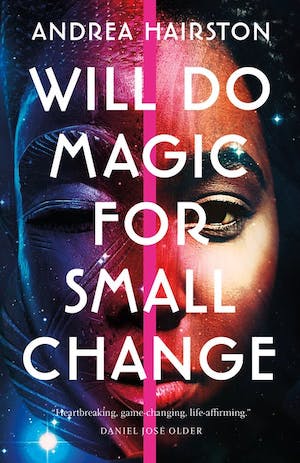

Will Do Magic for Small Change
At the risk of being a downer, the world is in a state of flaming chaos that is unlikely to abate any time soon. Bad things are likely to get far worse before they improve. And while plenty of folks will look toward apocalyptic doomsday scenarios, the truth of the matter is that we’ll probably still be around, no matter how rough things get; in some form or another, we will survive as a species. And our most heroic gestures at this point in time won’t have anything to do with rushing into danger and feats of great strength or sacrifice—they will be measured by how well we laid groundwork for the people who follow us.
If Strange New Worlds stays the course on this particular story, it will make Captain Pike’s life unique among the many Starfleet captains that populate Trek… and also arguably far more real. We should measure our importance by how we aid others and make the path easier to walk for whoever takes it next, not by how we’re remembered in history books. The truth of time and the nature of reality is that nearly everyone is forgotten eventually—and often our greatest heroes are the ones who did work that went unremarked and unnoticed. And that’s not a bad thing, so shouldn’t more of our heroic narratives reflect that concept? Shouldn’t it be modeled for us, especially in moments of unrest and fear?
There are plenty of delightful aspects (and certainly characters) to recommend Star Trek: Strange New Worlds, but this one was perhaps the most unexpected for me, and the most rewarding. Because if Star Trek is meant to help us envision a better future, that means it must do so at points when we’re not so sure about the one we’ve got. And the only way to meet that future head-on is by reframing our understanding of what it means to live our lives well.
Sometimes that means heading into the kitchen and making your crew breakfast. Sometimes it means setting your Chief Science Officer up with his soulmate. And sometimes it means staying the course, no matter what everyone around you thinks of fate. Because it’s not about you, or at least it can’t be all the time—it’s about all of us. And Christopher Pike believes that, like all true heroes should.
Emmet Asher-Perrin cries every time they watch the SNW opening credits. Seriously, every time. You can bug them on Twitter and Tumblr, and read more of their work here and elsewhere.










